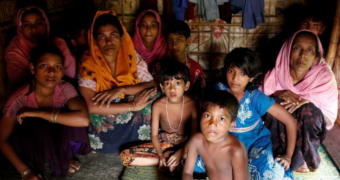Praised for accepting nearly half a million Rohingya refugees fleeing violence in Myanmar, poor and crowded Bangladesh is now shouldering much of the burden for their care.
That presents a complex challenge for the country's government. It must balance growing resentment among communities surrounding the camps, with aid agencies' calls for urgent international assistance to provide food, shelter and better — more permanent — facilities.
Everywhere you look around the refugee camps near the Bangladesh-Myanmar border, something is being built.
On hills untouched just weeks ago, huts are becoming homes, roads into the ever-expanding settlements are being paved and there's even a mosque under construction.
Men gather in and around a makeshift structure that will become a mosque.
PHOTO A mosque is built for Rohingya refugees in a camp on the Bangladesh-Myanmar border.
ABC NEWS: SOM PATIDAR
It gives you the sense that the Rohingya Muslims who have fled here expect to be staying a while, and certainly that's true of every refugee with whom the ABC has spoken in recent weeks.
"Why would we return to be slaughtered?" they invariably respond when asked if they would to go back to Myanmar.
But just an hour's drive away, in Bangladesh's beach destination of Cox's Bazar, neither locals nor visitors want this latest wave of Rohingya refugees getting too comfortable.
"Myanmar is their mother land, they should be back to there," said tourist Nurullah, visiting from Dhaka with friends.
A man stands on a beach looking concerned.
PHOTO Bangladeshi tourist Nurullah says the refugees should return to Myanmar.
ABC NEWS: SOM PATIDAR
Up from the beach, tuk-tuk driver Saiful Islam said simply: "In one word, they're a problem."
Asked why, he explains a commonly held concern here — that destitute and desperate, the refugees will resort to crime and begging, driving tourists away.
"They steal things and create issues," he said.
"Many of new arrivals are begging and numbers of beggars in town increased a lot."
Saiful Islam sits in his tuk tuk looking in the rear view mirror.
PHOTO Tuk tuk driver Saiful Islam says the Rohingya refugees are "a problem".
ABC NEWS: JAMES BENNETT
But another tuk-tuk driver we met was nervous for a different reason.
"Some people in the community know that I am a Rohingya while others do not," Shohid Ullah said.
Now 25, he came to Bangladesh as a four-year-old, when his family fled similar ethnic violence in the '90s.
Mr Ullah explained that anti-Rohingya sentiment has long been commonplace.
"People who know me as Rohingya feel I'm not good while those who do not know feel I'm not bad," he said.
But he hesitated when asked what impact the new refugees will have, at first saying they pose no issue, but then adding that he hopes they don't create problems.
"We will not face any problem with the new arrivals," he said.
"If they stay peacefully, there will be no problem. I hope they stay peacefully."
Rohingya driver Shohid Ullah sits in his tuk tuk
PHOTO Rohingya tuk tuk driver Shohid Ullah hopes the refugees live peacefully in Bangladesh.
ABC NEWS: SOM PATIDAR
Bangladesh has been widely praised for opening its border on humanitarian grounds.
But having done so, this small, poor and crowded country finds itself shouldering much of the financial and moral burden for nearly half a million destitute people.
The latest figures, issued this week by a group of UN monitoring agencies, estimates the tally since August 25 at 480,000, and there are contingency plans for as many as 700,000.
Why are the Rohingya stateless?
In Bangladesh they are a burden; in Myanmar they are despised. Where did the Rohingya come from and where do they belong?
Bangladesh has allocated fresh land for settlements and its military, well-respected here, has replaced the camps' initial chaos with some sense of order.
But as the initial wave of sympathy for the refugees' plight wanes, Bangladesh's Government will face increasing domestic opposition to scaling up the aid response, or anything which appears to entrench them.
For example, even though it has begun to register the new arrivals, at the weekend one minister said that didn't mean they were being afforded refugee status.
Prime Minister Sheikh Hasina has said Bangladesh wants them to return, and has called for Myanmar to allow the safe repatriation of those who fled the brutal "clearance operation" against a Rohingya insurgent group last month.
But Bangladesh can neither negotiate an end to Myanmar's ethnic conflict to make that possible, nor provide for the hundreds of thousands fleeing it in the meantime.
For both those things, this country — and its newest inhabitants — are depending on the rest of the world.
Upvote,comment and follow back please
Downvoting a post can decrease pending rewards and make it less visible. Common reasons:
Submit
nice post..
upvord me plz.
https://steemit.com/@alamin22
Downvoting a post can decrease pending rewards and make it less visible. Common reasons:
Submit